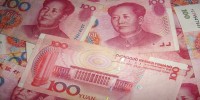Why China is devaluing the yuan
China's central bank has devalued its currency, the yuan, to its lowest rate against the US dollar in almost three years. The bank had on Tuesday announced it would start setting the daily rate based partly on the previous day's trading, bringing the yuan closer to a free-floating currency.
With China a major exporter, buyer of commodities and having a huge consumer market, stock markets and currencies worldwide have been rattled.
But why is China devaluing its currency?
China says the decision is all part of the plan to reform the way it manages its exchange rate. The central bank wants to keep the yuan "basically stable" while giving market forces a bigger role in the economy.
But China watchers say there's another reason behind the devaluation - and one that's far closer to home.
The Chinese currency has effectively strengthened against other Asian currencies in the last 12 months - by more than 10%. This makes Chinese goods more expensive abroad. Nevertheless, it still came as a shock to the Chinese that their export figures have slumped, compared to a year ago.
That's worrying news for Chinese factories, which in turn provide jobs for millions of Chinese villagers. Economists say the government may be trying to avoid job losses at these factories by weakening the yuan.
The export story is just one part of it however. Analysts have also pointed to China's longer-term goal of turning the yuan into a global reserve currency.
A global reserve currency is a currency that is held in significant quantities by governments and banks as part of their foreign exchange reserves and is commonly used in international transactions. People who live in a country that issues a reserve currency can purchase imports and borrow across borders more cheaply than people in other nations because they don't need to exchange their currency to do so.
Later this year the International Monetary Fund (IMF) is expected to announce whether or not the Chinese yuan will be allowed into the elite reserve currency club which includes the dollar, the euro, the pound and the yen.
In the past the IMF has said that China needs to have a flexible exchange rate, so that the value of the yuan adjusts to China's growth - the way currencies do in other market-driven economies. The devaluation could thus be seen as a step in the right direction.
(All images - credit: Wikimedia Commons under Creative Commons licence)










-200x100.jpg)
-200x100.jpg)



